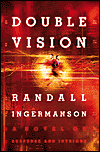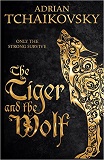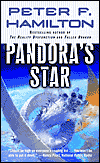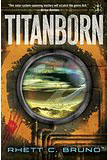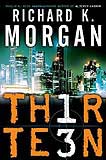
Thirteen, by Richard K. Morgan
Book Review by Pete S. Allen
Have you read this book?
There's been a lot of talk in the last several years about the deep,
even, and almost polar divide that exists between segments of the US.
This divide is largely political, but the political aspect of it merely
reflects the ideological core. Combine a very plausible application of
this rift with economic and globalization factors, add the exponential
increase of technology, and let it bake for a hundred years, give or
take, and you get Thirteen.
Richard K. Morgan's newest novel is, for all intents and purposes, a detective story, and the plot follows the detective story rhythm. However, many of Morgan's other novels have been called "genre-bending" (by the NY Times Book Review, if you need a source) and the term would definitely apply here. Thirteen is not simply a detective story set in the future, because the elements of the plot that work rely on the futuristic setting to keep going. Indeed, the setting in this book is as distinct and well-developed, and as integral, as any of the characters. And that's saying something.
The world of one hundred years hence is largely globalized, made even smaller by suborbital transports (Miami to London in 45 minutes, anyone?) and a more integrated market economy. The US (and possibly Canada, though this is vague) is divided into three separate countries: the Rim (or Pacific Rim ? the West Coast), the Union (the northeastern states) and the old Republic (pretty much everywhere else), commonly referred to as Jesusland. The secessions were caused by economic stress and opportunity, and seem to have been largely peaceful.
Apart from advanced household and business technology, which is largely extrapolated from current technology and so is pretty easy to catch up with, the main "novum" or "new idea" is that of Martian colonization ? this is new in the sense that it's an idea outside our current technological aims, not an original idea necessarily. The other big technological aspect integral to the book is that of genetically engineered humans ? definitely not a novum, as designer genes seem just over the horizon even now.
Briefly, our main protagonist, Carl Marsalis, is a thirteen, a genetically enhanced human, designed to be a super-soldier type. Fortunately for him, being Black is no longer much of an issue--most racist ideologies are things of the past. Unfortunately, as a thirteen, he's subject to an entirely new form of prejudice. Marsalis is British, and essentially a bounty hunter, working for the UN organization responsible for keeping track of all genetically enhanced humans (or twists in the common slang).
Thirteens are relegated either to internment reservations or to Mars, and any outside these areas are to be collected by him, and a few others like him. There are other enhanced humans, but the thirteens are the only ones interned, the others not being deemed dangerous to (though still subject to persecution from) society. Marsalis is recruited away from the UN by COLIN, the Colonization Initiative, to help with an investigation of a renegade thirteen who has escaped from Mars. He joins Sevgi Eretkin and Tom Norton, both COLIN agents in charge of the investigation, and both with a few problems of their own.
As I mentioned earlier, the plot is largely detective-style driven, but this in no way should be taken to mean that it's simplistic or not enjoyable. Quite the opposite -- as Marsalis makes his way through our future world, we're exposed to his thoughts, as they are influenced by his status as a black man, a British citizen, and as a genetic outsider -- considered by most to not even be human. The problems he faces with the systems and people he encounters (and it's a world-wide trip) help paint a vivid picture, and while not quite dystopian, the novel is definitely bleak in some of its outlook, despite the character Evetkin's protests to the contrary.
Without giving away more of the story, I will say that Morgan is a very talented writer, giving the reader several very well-developed and sympathetic characters, a gripping narrative, and a future well worth looking at (and potentially learning some lessons from). Noir-y in its execution, and somewhat reminiscent of Blade Runner (not surprising that Morgan won the Philip K Dick award), the book doesn't miss any of the subplots threaded through it, and allows the reader to tie them up with Marsalis. I thoroughly enjoyed Thirteen, and will be looking for other books from this relatively new to the scene author. I was on vacation while I read it, and it certainly kept me glued to my patio chair, which admittedly might not be as hard in Mexico as it might be otherwise, but I did skip several trips to the pool to keep reading.
Richard K. Morgan's newest novel is, for all intents and purposes, a detective story, and the plot follows the detective story rhythm. However, many of Morgan's other novels have been called "genre-bending" (by the NY Times Book Review, if you need a source) and the term would definitely apply here. Thirteen is not simply a detective story set in the future, because the elements of the plot that work rely on the futuristic setting to keep going. Indeed, the setting in this book is as distinct and well-developed, and as integral, as any of the characters. And that's saying something.
The world of one hundred years hence is largely globalized, made even smaller by suborbital transports (Miami to London in 45 minutes, anyone?) and a more integrated market economy. The US (and possibly Canada, though this is vague) is divided into three separate countries: the Rim (or Pacific Rim ? the West Coast), the Union (the northeastern states) and the old Republic (pretty much everywhere else), commonly referred to as Jesusland. The secessions were caused by economic stress and opportunity, and seem to have been largely peaceful.
Apart from advanced household and business technology, which is largely extrapolated from current technology and so is pretty easy to catch up with, the main "novum" or "new idea" is that of Martian colonization ? this is new in the sense that it's an idea outside our current technological aims, not an original idea necessarily. The other big technological aspect integral to the book is that of genetically engineered humans ? definitely not a novum, as designer genes seem just over the horizon even now.
Briefly, our main protagonist, Carl Marsalis, is a thirteen, a genetically enhanced human, designed to be a super-soldier type. Fortunately for him, being Black is no longer much of an issue--most racist ideologies are things of the past. Unfortunately, as a thirteen, he's subject to an entirely new form of prejudice. Marsalis is British, and essentially a bounty hunter, working for the UN organization responsible for keeping track of all genetically enhanced humans (or twists in the common slang).
Thirteens are relegated either to internment reservations or to Mars, and any outside these areas are to be collected by him, and a few others like him. There are other enhanced humans, but the thirteens are the only ones interned, the others not being deemed dangerous to (though still subject to persecution from) society. Marsalis is recruited away from the UN by COLIN, the Colonization Initiative, to help with an investigation of a renegade thirteen who has escaped from Mars. He joins Sevgi Eretkin and Tom Norton, both COLIN agents in charge of the investigation, and both with a few problems of their own.
As I mentioned earlier, the plot is largely detective-style driven, but this in no way should be taken to mean that it's simplistic or not enjoyable. Quite the opposite -- as Marsalis makes his way through our future world, we're exposed to his thoughts, as they are influenced by his status as a black man, a British citizen, and as a genetic outsider -- considered by most to not even be human. The problems he faces with the systems and people he encounters (and it's a world-wide trip) help paint a vivid picture, and while not quite dystopian, the novel is definitely bleak in some of its outlook, despite the character Evetkin's protests to the contrary.
Without giving away more of the story, I will say that Morgan is a very talented writer, giving the reader several very well-developed and sympathetic characters, a gripping narrative, and a future well worth looking at (and potentially learning some lessons from). Noir-y in its execution, and somewhat reminiscent of Blade Runner (not surprising that Morgan won the Philip K Dick award), the book doesn't miss any of the subplots threaded through it, and allows the reader to tie them up with Marsalis. I thoroughly enjoyed Thirteen, and will be looking for other books from this relatively new to the scene author. I was on vacation while I read it, and it certainly kept me glued to my patio chair, which admittedly might not be as hard in Mexico as it might be otherwise, but I did skip several trips to the pool to keep reading.
|
Click here to buy Thirteen, by Richard K. Morgan on Amazon
|
Thirteen, by Richard K. Morgan on Amazon

| More Books You Might Like |
Comment on Thirteen, by Richard K. Morgan
| Comments on Thirteen, by Richard K. Morgan |
| There are no comments on this book. |
